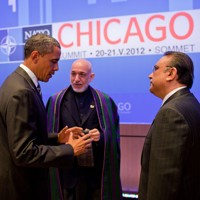Editor's note: This is the second in a two-part series examining the challenges to reaching a sustainable peace in Afghanistan. Part I examined the domestic challenges to national reconciliation. Part II examines the regional context of the Afghan peace process.
When NATO leaders gathered in Chicago earlier this week for a much-awaited summit, the withdrawal strategy for Afghanistan dominated the proceedings. A twist in the plot had developed in the lead-up to the gathering when NATO extended a last-minute invitation to Pakistani President Asif Ali Zardari. The logic was straightforward: The occasion would be used not only to reach an agreement with Pakistan over reopening NATO supply lines that have been closed since November, but also to include Pakistan in discussions of Afghanistan’s future because of Islamabad’s importance in efforts to stabilize the country.
Despite the emphasis put on Pakistan’s role, it is not the only state with deep interests and involvement in Afghanistan, and its support is not the only regional element needed to ensure stability there. Several other states in the region have significant and competing interests in Afghanistan and will also directly impact the outcome. Establishing a sustainable peace in Afghanistan will therefore require maneuvering carefully within this minefield of divergent and complex foreign interests.

